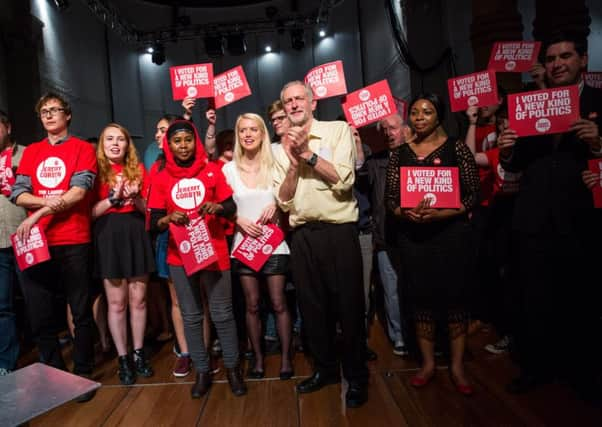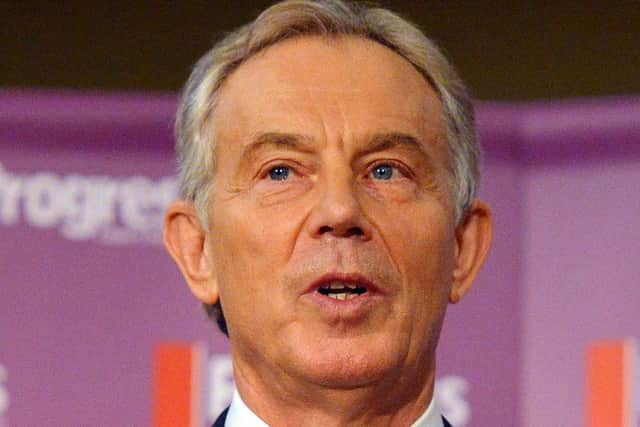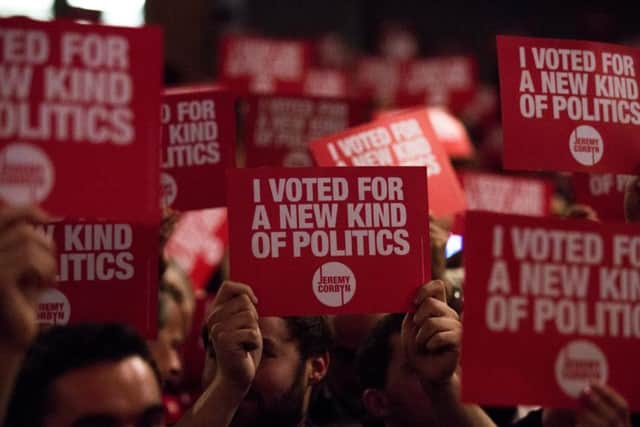Jeremy Corbyn to be new Scargill, warns Cameron


Mr Corbyn is expected to secure victory thanks to a new system for choosing Labour’s leader which opened up the contest to non-party members who paid £3 to become “registered supporters” with the right to vote – heralding a leftwards shift for the party that will radically alter the complexion of British politics.
The left-wing agenda and anti-austerity promises offered by Mr Corbyn have led to an extraordinary surge in support for the veteran politician, who had previously been regarded as a rank outsider.
Advertisement
Hide AdAdvertisement
Hide AdNow the main opposition party is bracing itself for a dramatic realignment, with a comprehensive rejection of the New Labour values that brought Tony Blair three election victories.


Although some pundits had talked up the possibility of Yvette Cooper making a final burst to succeed Ed Miliband, it looked almost certain last night that Mr Corbyn would be elected leader when the result of the leadership contest is announced this morning.
Labour sources within the camps of Mr Corbyn’s rivals – Ms Cooper, Andy Burnham and Liz Kendall – were privately conceding defeat last night.
In anticipation of a Corbyn victory, Mr Cameron warned that Mr Corbyn would try to take Britain back “to the days of Michael Foot and Arthur Scargill” in the 1980s. Mr Cameron said he feared that the frontrunner to succeed Ed Miliband would seek to reopen arguments over nationalisation, nuclear weapons, taxation and union laws which had been the subject of consensus between the parties in recent decades.
“You need a good opposition to hold the government to account,” the Prime Minister said. “I just hope we have an opposition where we are not going back to a whole lot of arguments that I thought we dealt with in the 1980s about it being time to nationalise half of British industry or get rid of our nuclear deterrent.


“These are arguments I thought we had dealt with and I thought our country was stronger for having a Labour Party and a Conservative Party who violently disagreed about lots of things but accepted a free enterprise economy, strong defence, trade unions under the law, not nationalising everything in sight, trying to keep tax rates low.
“Those were sort of shared objectives and I think the country is stronger when you have shared objectives rather than when you’ve got someone who wants to take us back to the days of Michael Foot and Arthur Scargill.” Mr Corbyn has energised a groundswell of left-wing support by addressing rallies across the country arguing for higher taxes, renationalisation, scrapping nuclear weapons and withdrawing from Nato.
The Prime Minister had earlier pounced on remarks by Mr Corbyn that he would not have authorised the recent missile attack in Syria which killed the terrorist Reyaad Khan and fellow UK jihadist Ruhul Amin.
Advertisement
Hide AdAdvertisement
Hide Ad“Frankly, the risk there is today can be summed up in one word: security,” said Mr Cameron. “People desperately want in our country economic security so their families can get on, national security so our country can be safe.
“I think that frankly all the candidates for the Labour leadership demonstrate the same problem, which is they will not deliver the economic security that we need because they won’t deal with the deficit – some of them are in favour of printing money Zimbabwe style – they won’t deliver the national security we need at a time of trouble, whether we are dealing with terrorism or Russian expansionism in Europe or other problems in our world.”
The Prime Minister said he had watched the contest with “bewilderment” and argued that, whoever wins today, Labour is now an extreme party that “no longer represents working people”.
Last night one Labour source said party intelligence estimated Mr Corbyn would secure 40 per cent of party members’ votes and 55 per cent of the trade union and other affiliate votes.
On top of that, the source claimed Mr Corbyn could claim up to 75 per cent of the £3 registered supporters’ votes – a proportion that could see him win in the first round.
“The registered supporters are voting overwhelmingly for Corbyn, so it looks very much like he is going to win,” the source said.
Predictions of a Corbyn win were given more credibility with the unexpected election of Sadiq Khan as Labour’s London mayor candidate yesterday.
Mr Khan was the beneficiary of a left-wing surge which saw him overcome the Blairite front-runner Tessa Jowell.
Advertisement
Hide AdAdvertisement
Hide AdTellingly, Mr Khan won despite Ms Jowell winning the most support amongst paid-up party members. Mr Khan was carried over the finishing line by overwhelmingly winning the support of the £3 registered supporters.
More evidence to support Mr Corbyn being unveiled as the new leader came in an internet poll conducted by the Labour-List website. Almost 3,000 readers of the website took part in the survey, which saw Mr Corbyn take 52 per cent of the vote. Ms Cooper was in second place with 23 per cent, Mr Burnham in third place with 13 per cent and Ms Kendall bringing up the rear with 12 per cent.
Mr Corbyn faces a huge challenge to unite the party following a long and divisive contest which seen the “Corbynmania” phenomenon set his highly motivated supporters against the Labour establishment.
Behind the scenes, Mr Corbyn has been attempting to reach out to influential figures within the Labour mainstream amid reports that current front-benchers will find it impossible to serve in his shadow cabinet.
“Jeremy has been speaking with senior party figures in an attempt to get people behind him,” said a Labour source. “He has to appoint a shadow cabinet and I think we may see some people climbing down from their threats not to work with him for the sake of party unity.
“Many people from the rival camps are resigned to giving him the benefit of the doubt to see how he gets on. If he gets pummelled over the next 18 months, it is likely that he would step down of his own accord.
“But most people do not intend to split the party on purpose.”